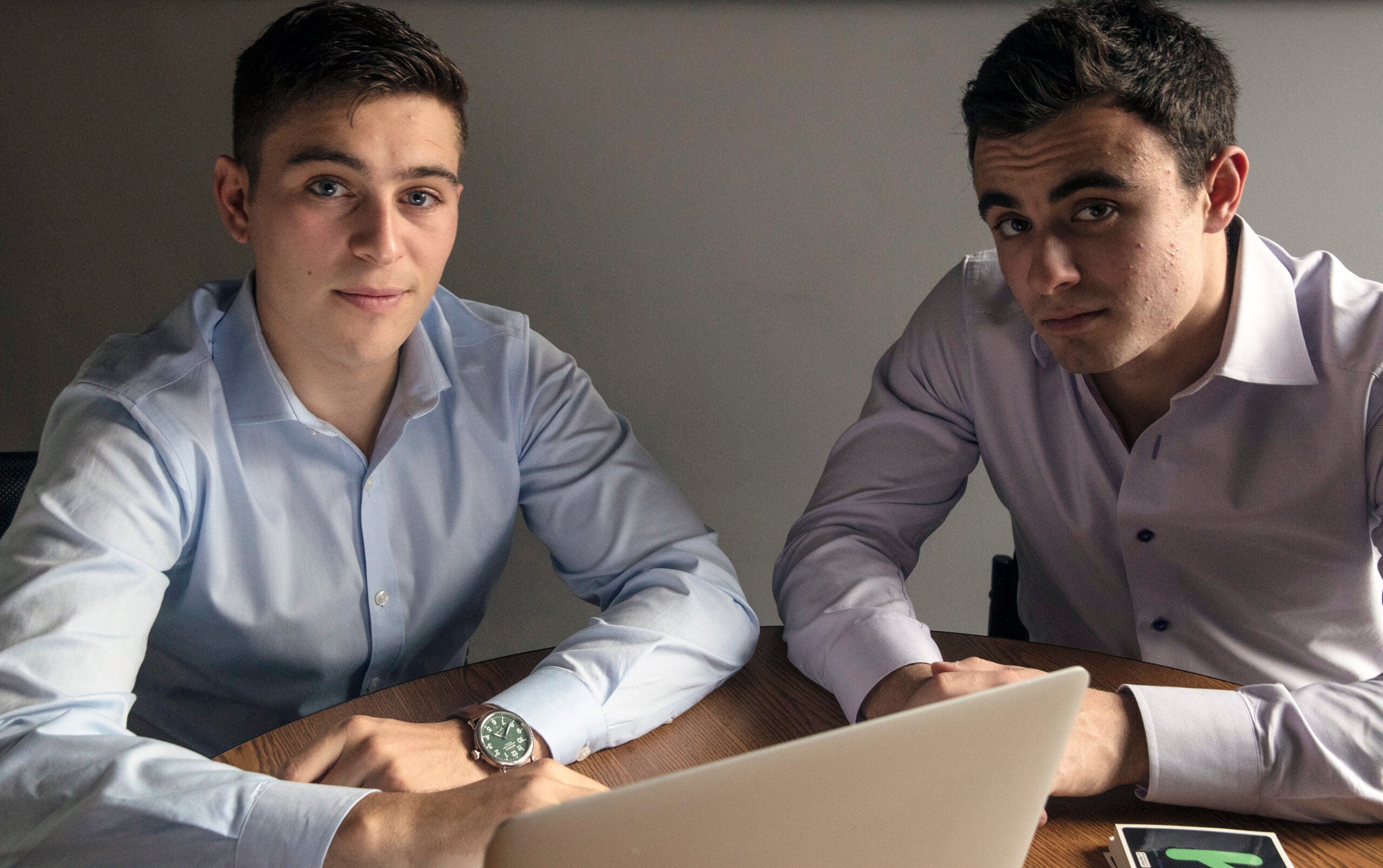KINGSTON, R.I. – Nov. 4, 2019 – University of Rhode Island students Andrew Bikash and Ben Grossman experienced the same feelings as their residence hall neighbors when they first came to campus in the fall of 2017. They all wanted to create something that could be profitable and lasting.
The College of Business juniors have done just that – developing a peer-to-peer app, Kanu, which will allow students to network across campus and help them launch their own entrepreneurial ambitions.
“We saw students in our dorm that all have a similar drive that we do,” says Bikash, an entrepreneurial major from East Greenwich. “They all wanted to make money on their own and they wanted to do something to leave a legacy. We created this app as a shortcut to achieve their visions, to harness what they’re interested in.”
Kanu – pronounced “can you” – provides a platform that allows users to buy and sell items, using a map interface that shows the location of posted goods, services, and requests. But the app, which is expected to be launched in spring 2020 through app stores for iPhone and Android, also expands the ability for users to create “side hustles” or gig jobs – such as tutoring or delivery services – and offer them to the University community.
“It’s a community centered around business ideas,” says Grossman, a marketing major from Fort Washington, Pennsylvania, “whether you’re looking for a job or to offer a service, trying to find a particular service, or just wanting to explore the opportunities within your community.”
Recently, their work on Kanu garnered top honors for oral presentation in URI’s 2019 Showcase of Undergraduate Research, Scholarly and Creative Works, which featured the work of 58 students across 27 unique majors. Grossman and Bikash were also recently named to the online publication Rhode Island Inno’s “Inno Under 25.”
The business partners, who met through a campus leadership program, started defining their business goals as first-year students, conducting market research by surveying neighbors in the College of Business Living and Learning Community in Fayerweather Hall. In fine-tuning their vision, they decided a smartphone application was the best way to reach fellow students, and have worked with an outside developer to design the app.
“We weren’t app developers when we got into this,” says Grossman. “We really just had an idea, knew what technology was out there, and which our generation uses most frequently. We’ve shaped this platform around technology we admire and to provide a state-of-the-art service/delivery portal.”
Kanu provides a safe platform for users, presenting a community-wide marketplace, but also allowing users to select who they contact. “Technology allows someone to cast a wide net,” Grossman says. “You can make a post and interact with 14,000 kids. That’s compelling but also not accessible to a lot of students. We saw that firsthand. Our peers were attempting to sell things on channels like Facebook Groups but didn’t get much of a response because our peers don’t engage in those mass settings. We have focused on remedying that issue by creating a safe and local social marketplace that is by students and for students, which enhances the college experience for all students.”
Nancy Forster-Holt, assistant business professor and developer of the College of Business’ Innovation and Entrepreneurship program, has served as a faculty mentor for the project. She says the pair have shown the right instincts as young entrepreneurs. They’ve routinely solicited feedback from advisers, along with about 350 users of an early version of the app. They’ve studied other businesses and haven’t been afraid to discuss their business ideas and put their beliefs to the test, she says.
“There’s a long journey from idea to business, and what makes a difference is, have you found and solved a real problem for people,” says Forster-Holt. “I saw deep evidence of that in their search. They wanted to do something to make a difference on campus. They took the time to ask students what is a problem on campus. They heard all kinds of things, but it formed around a theme of students need goods and services. There was a marketplace opportunity for them.”
Honing their business model and developing the app have provided an education of their own, Bikash says. “The whole process has had a huge impact on our communication skills and has taught us numerous business lessons that could not be learned in the classroom,” he says. “For example, our relationship with the development firm has taught us about how business is conducted and that thoughtful planning, soliciting feedback, and communication are critical to being a productive entrepreneur in the business world.”
As their business evolves, they are exploring another way it can benefit entrepreneurs – besides providing a ready-made marketplace. For the last six months, they and Forster-Holt have been exploring the educational opportunities the app presents.
Forster-Holt has used Kanu in her class BUS 149: Introduction to Entrepreneurship. It has provided a platform for students to realistically test their business plans. The nearly 50 students in the class have formed about 20 teams charged with creating individual business plans and launching those businesses through the Kanu marketplace.
“Here’s the beauty of Kanu,” says Forster-Holt. “You can test different business models. You can see what the market needs. The successes and the failures are real. This is something you cannot get through a traditional classroom simulation.”
In January, Bikash and Grossman will travel with Forster-Holt to New Orleans to present the classroom exercise at the United States Association of Small Business Entrepreneurship convention. “USASBE is all about pedagogy and entrepreneurship education,” she says. “To be accepted by that group is really a feather in their cap.”
“We see a lot of potential in Kanu’s educational path,” says Grossman. “It’s a great use of Kanu, and we are already amazed and excited by the creativity and ingenuity displayed by students in Professor Forster-Holt’s class.”

